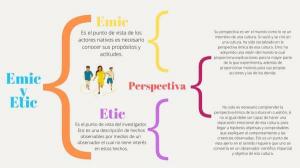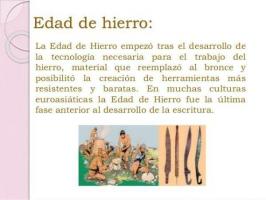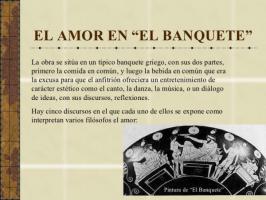René DESCARTES and the scientific method
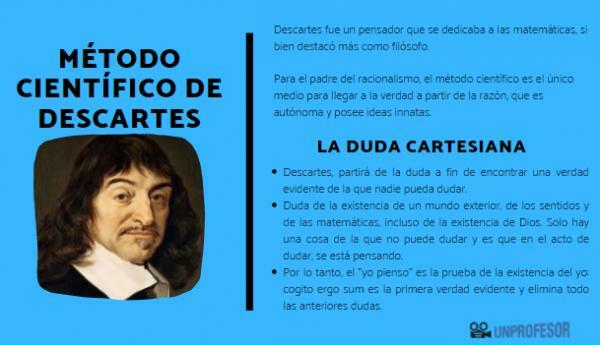
In this lesson from a TEACHER we explain Descartes' scientific method, a thinker who was dedicated to mathematics, although he stood out more as a philosopher. For the father of rationalism, the scientific method is the only way to get to the truth, starting from reason, which is autonomous and has innate ideas. Descartes, will start from doubt in order to find an obvious truth that no one can doubt.
That first obvious truth will be the Cogito ergo sumwhich he reaches by applying his method. The I think, therefore I am, is presented to the mind so clear and distinct that it is impossible to doubt it, and with such certainty, that one can be sure of its evidence. If you want to know more about Descartes' scientific method, continue reading this article by a PROFESSOR. Attentive!, the class begins!
Index
- The Unification of All Sciences: Mathesis Universalis
- The rules of the Cartesian method
- The scientific method and doubt
- Conclution
The Unification of All Sciences: Mathesis Universalis.
More than an evolution, in the Descartes thought there is continuous effort to build the edifice of knowledge, that in his time seemed useless and useless to him. For this reason, it is necessary to tear it down and build a new totally unitary building. In the Discourse on the Method, the philosopher expresses it in the following way: "the buildings that have been undertaken and finished by a single architect, tend to be more beautiful than those others that several have tried to restore."
What Descartes claims is that his method is used for all other sciences:
"My designs have never been other than to try to reform my own thoughts and build on ground that was totally new."
But how is the unification of all the sciences possible?
Descartes method
Descartes' ambitious project proposes the unification of all the sciences into one, since, according to this author, there are compelling reasons to do so, namely:
- to) All sciences are only human knowledge, which is always one and the same, although its object of application (1st rule) and each of the sciences are no more that the different manifestations of a unique wisdom (prudence), which is so, because reason is also only.
- b) There is only one method for each and every one of the sciences. It's universal. Not like Aristotle, who thought that each science, being different, required a different method. Descartes, however, recognizes only one method, the mathematical one.
- c) The different sciences form a unit. All Philosophy is like a tree, whose roots are metaphysics, the trunk is physics, and the branches constitute all the others. sciences, which can well be reduced to: Medicine, Mechanics and Morals, the latter, the highest and perfect and the last degree of the to know.
The rules of the Cartesian method.
Discards was dedicated to mathHe was a scientist, but he will be more important as a philosopher. His objective was to legitimize the new science from the thought of Copernicus with the objective that this new science would end up imposing itself. He does it from within, as a philosopher.
Establish a Deductive method, with the aim of creating a situation of social legitimacy for science and establishing a valid method for all scientists.
The new science is based on the experience and creating a mathematical model. Furthermore, Descartes proposes 4 principles of the Cartesian method:
- Evidence
- Analysis
- Synthesis
- Enumeration
Four rules of the Cartesian method
- 1ª. Evidence. "Do not admit anything as true if you do not know with evidence that it is, that is, carefully avoid precipitation and prevention, and not to understand in my judgments anything more than what is presented so clearly and distinctly to my mind, that there was no to question it. "That is, not to admit as true anything that does not present itself to the mind as an idea so clear and distinct from which it is not may doubt. Otherwise, it will be provisionally false.
- 2ª. Analysis. "Divide each of the difficulties that I will examine into as many parts as possible and as many as your best solution requires." Simplify and reduce each idea in order to find the best solution.
- 3ª. Synthesis. "To guide my thoughts in an orderly fashion, starting with the simplest and easiest objects to know, to gradually rise to the knowledge of the most compound and even assuming an order between those that do not naturally precede. " Go from the simplest ideas to the most complex ones, order the thoughts.
- 4ª. Enumerations and revisions. "Do such comprehensive counts and general checks on everything that you were sure not to miss anything." Any conclusion will be provisional, because science is always reviewable.
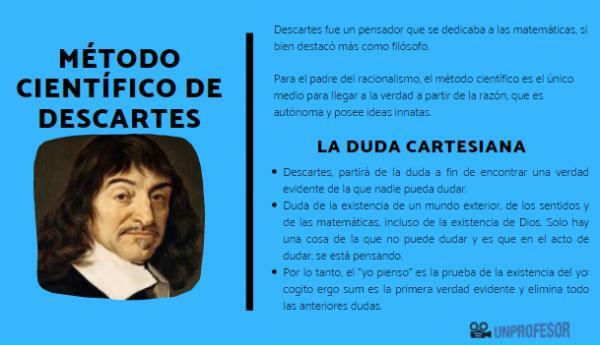
The scientific method and doubt.
The Cartesian method part of the doubt in order to consider false everything that is not presented so clearly and differently that it is impossible to doubt it. It is not a skeptical doubt but a universal, methodical, theoretical, hyperbolic and exaggerated doubt.
First, Descartes doubts the existence of an outside world, of the senses and of mathematics, even of the existence of God. But there is only one thing that you cannot doubt, and that is that in the act of doubting, you are thinking. Therefore, the I think, is the proof of the existence of the I. The Cogito ergo sum is the first obvious truth and eliminate all the previous doubts.
"So after having thought about it and carefully examined all things, you have to conclude, and consider sure, that this proposition: I think, I exist, is necessarily true, every time I pronounce it or conceive it in my spirit".
Conclution.
The Cartesian project supposes: the formulation of a method, of moral norms and the development of the different sciences, metaphysics (which is the root of science), physics and the rest. Immanuel Kant, like the empiricists, are against the inclusion of metaphysics within the other sciences.
Descartes's scientific method is not so scientific, since part of metaphysical presuppositions. And here is the Achilles heel of Cartesian thought.
If you want to read more articles similar to René Descartes and the scientific method, we recommend that you enter our category of Philosophy.
Bibliography
Descartes. R. The Discourse of the Method, Editorial Alliance, 1985.

